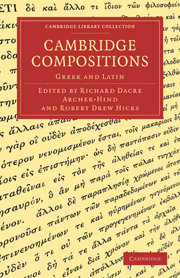TRANSLATIONS INTO LATIN PROSE
Published online by Cambridge University Press: 07 September 2010
Summary
FOR indeed a change was coming upon the world, the meaning and direction of which even still is hidden from us, the change from era to era. The paths trodden by the footsteps of ages were broken up: old things were passing away, and the faith and the life of ten centuries were dissolving like a dream. Chivalry was dying, the abbey and the castle were soon together to crumble into ruins; and all the forms, desires, beliefs, convictions, of the old world were passing away, never to return. A new continent had risen up beyond the western sea. The floor of heaven inlaid with stars had sunk back into an infinite abyss of immeasurable space; and the firm earth itself, unfixed from its foundations, was seen to be but a small atom in the awful vastness of the universe. In the fabric of habit, which they had so laboriously built for themselves, mankind were to remain no longer. And now it is all gone—like an unsubstantial pageant faded; and between us and the old English there lies a gulf of mystery which the prose of the historian will never adequately bridge. They cannot come to us, and our imagination can but feebly penetrate to them. Only among the aisles of the cathedrals, only as we gaze upon their silent figures sleeping on their tombs, some faint conceptions float before us of what these men were when they were alive; and perhaps in the sound of church bells, that peculiar creation of mediaeval age, which falls upon the ear like an echo of a vanished world.
- Type
- Chapter
- Information
- Cambridge CompositionsGreek and Latin, pp. 123 - 244Publisher: Cambridge University PressPrint publication year: 2009First published in: 1899



